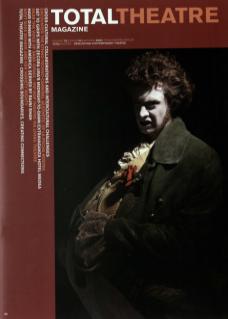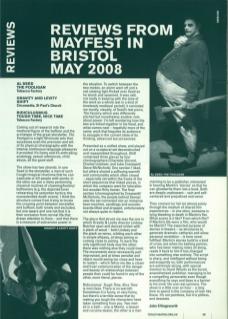Coming out of research into the medieval figure of the buffoon and the archetype of the great storyteller, The Fooligan is a tight 50 minute solo that surpasses even the precision and wit of its physical choreography with the intense continuous language-pleasures it provided. It's funny and it's enthralling: scatology, sexual references, child abuse, all the good stuff.
The show has two strands. In one Seed is the storyteller, a man of such (rough) magical charisma that he can captivate or kill people with words; in the other we see a mime performing classical routines of clowning/foolery/buffoonery (e.g. the dejected lover rehearsing his seduction tactics; the overextended death scene). I think the structure comes from trying to locate the crossing point between storyteller and buffoon, both lonely and excluded, but one aware and one not that it is their exclusion from normal life that draws attention to them and that there is a measure of subversive power in the situation. To switch between the two modes, an alarm went off and a red rotating light flicked over Seed as he shook and spasmed. It was odd, not really in keeping with the tone of the work as a whole (set in a kind of timelessly medieval period); it reminded me mostly, visually, of Seed's last piece, The Factory, which was differently pitched but nonetheless another solo about power. I'm left wondering how the two are linked together in his head, and what comes next – hopefully more of the same: work that beguiles its audience to smuggle in the current state of its thinking, advanced but unresolved.
Presented as a unified show, and played out on a sculptural set deconstructed and reassembled throughout, Shift comprised three pieces by four choreographers (Charlotte Vincent, Charles Lineham, and Luke Cresswell / Steve McNichols). One section I liked, but others shared a suffusing warmth and communality which often cloyed – especially set within the frame of the short sequences that linked pieces, in which the company went for tolerable-but-wooden flirty banter. The final section (choreographed by Cresswell / McNichols, the people behind Stomp) saw the set converted into an immense beat-machine, sandbags and wooden boards lifted and dropped, unfortunately not always quite in rhythm.
The piece that struck me was the one in which Gravity & Levity director Lindsey Butcher spun and danced midair with a plank of wood – both Lindsey and the plank on wires, orbiting each other in simple ellipses, at times joining or coming close to joining. To each the only significant body was the other: there was nothing else they could meet. The movements were necessarily part improvised, and at times aerialist and object would swing too close and have to restart – which felt to me like a closer and truer communication of the danger and beauty of relationships between people than could be found in any of the other, more literal, pieces.
Ridiculsmus' Tough Time, Nice Time is merciless. There is no warmth. Sometimes it is funny, or very funny, but there's a terrible sense that by making you laugh the characters have taken something from you. Two men sit in a bath – one is Martin, a lawyer and cocaine dealer; the other is a man claiming to be a publisher, interested in hearing Martin's 'stories' so that he can ghostwrite them into a book. Both are deeply unpleasant – vain and self-centered and prejudiced and venal.
They connect (or fail to) almost solely through the medium of shared film experiences – in one story, someone is lying bleeding to death in Martin's flat. What scene is it like? From which film? If Martin's life were a film who would be Martin? The expected purpose of stories in theatre – as structures to generate dramatic catharsis and allow personal revelation – is here never fulfilled: Martin's stories build to a kind of crisis, but when his bathing partner, who has been making notes all along, reads it back to him it has changed into something else entirely. The script is sharp, and intelligent without being extravagantly so; both performances are extremely strong, with special mention to David Woods as the bored, anaesthetised publisher, managing to be a compelling personality even though everything he says and does is a barrier to his inner life and real opinions. The show is a little over an hour – a long time to spend in the company of men like these. It's not pointless, but it is pitiless, and desolate.

